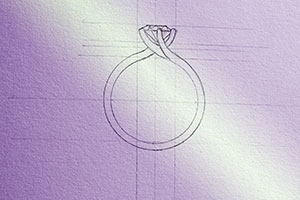Getting engaged and getting married are often the most romantic moments in our lives. However, people don't know if they are wearing ethical rings as they are not aware that the creation of beautiful rings can be synonymous with human rights abuses and environmental damage.
Here, ethical jeweller Tim Ingle reveals the truth behind the diamond trade, and the five questions we should all ask before purchasing a wedding or engagement ring to make sure it’s ethical.
“When it comes to engagement rings, diamonds are particularly problematic. ‘Blood’ diamonds are mined in war-torn countries where conflict is often funded by the diamond trade. Here, diamonds signify worker exploitation and atrocious human rights abuses rather than romance and commitment. Diamond miners are some of the poorest people on the planet and work in extremely dangerous conditions.
“Not only this, but diamond mining has taken a huge toll on the environment across Africa and other parts of the world. In Angola, mining has led to deforestation, soil erosion, and the relocation of local people. Elsewhere, wildlife has vanished, mines have been abandoned and the landscape is now desolate after years of irresponsible exploitation.
 “Not to mention the metal band itself, with poorly sourced gold seeing one ring generate as much as 20 tonnes of waste. Other precious metals aren’t far behind.”
“Not to mention the metal band itself, with poorly sourced gold seeing one ring generate as much as 20 tonnes of waste. Other precious metals aren’t far behind.”
This is what those getting engaged or married should ask their jewellers if they’re to ensure their rings have been made to the highest ethical standard:
Are you wearing ethical rings?
1. Is the stone conflict-free?
Many jewellers will tell you that their diamonds are “Kimberley-certified” and are therefore conflict-free - but this is not enough. The Kimberley Process Certification Scheme (KPCS) was introduced in 2002 in an attempt to eliminate the trade in conflict diamonds; however diamonds produced in conflict zones are still being smuggled to KPCS regions to be certified. The problem is therefore far from eradicated, and blood diamonds from places like eastern DRC and Zimbabwe are still on the market.
If your jeweller cannot trace a precious stone back to its source, you cannot be certain that it is conflict-free. Kimberley Process Certification is not enough.
2. Can my jeweller tell me exactly where this stone was produced?
If your jeweller cannot trace a precious stone back to its exact source, you cannot be certain that it hasn’t been smuggled from a conflict zone, so you should steer clear.
For example, Ingle & Rhode’s diamonds come only from the Ekati and Diavik mines in Canada where they are mined, cut and polished with due care for the environment and human rights. Many of the larger stones are even engraved. They are all traceable and 100% conflict-free.
3. Where has this diamond been cut and polished?
Despite being conflict-free, many diamonds and other precious stones are still cut and polished in sweatshop conditions, often by children, for well below the minimum wage.
Make sure your jeweller knows your stone’s source, so that you can be sure it has been cut and polished according to strict guidelines.
4. Is the metal either Fairtrade or recycled platinum?
Ask you jeweller if they source certified Fairtrade gold. Workers in Fairtrade certified gold mines receive a guaranteed Fairtrade Minimum Price for their gold as well as a Premium to spend on improving their businesses or on community projects, such as education, clean water and healthcare.
If you’re looking for a platinum ring, unfortunately there is no Fairtrade platinum available at the moment. However, you should ask your jeweller if they can offer recycled platinum. Recycled platinum is indistinguishable from new metal but greatly reduces demand on mines, thereby lessening the impact of unethical mining practices.
5. Where will my ring be made and by who?
Most of the jewellery bought in the UK has been manufactured in countries in Asia. This is a cost saving approach for businesses here, but comes at the expense of working conditions and pay as well as the quality of the finished ring. The best jewellery is not made this way. Your jeweller should be able to tell you exactly where your jewellery was made, and ideally the names of the craftsmen and women who created it. For example Ingle & Rhode only use craftsmen and designers here in the UK so you know your ring hasn’t had to travel miles around the globe.
To take a look at Ingle & Rhode’s ethical rings visit their website here.


Add new comment